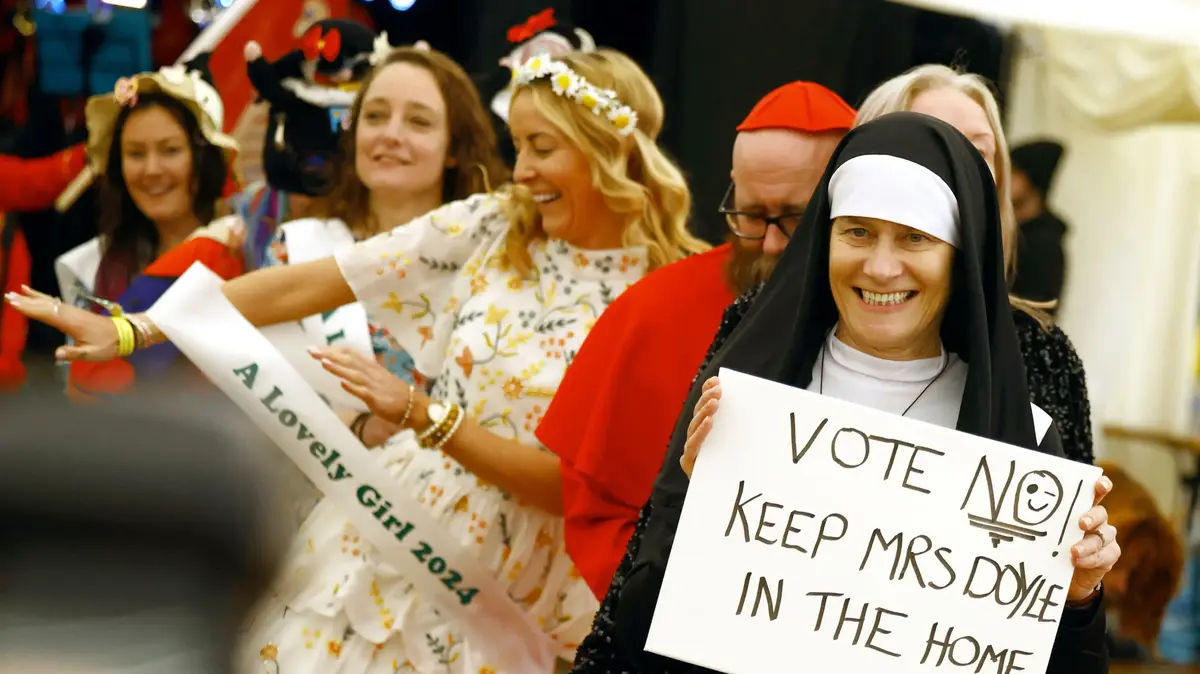A woman holds a protest sign against changes to referendums on the role of women and the family at the Tedfast festival, Inis Moor Island, Ireland, March 9, 2024/Reuters
An attempt to change the Irish constitution, which includes outdated definitions regarding the role of the family and women, registered a discriminatory weekend, with its rejection in two referendums promoted by the government at the same time as International Women's Day.
The first proposal called for changing the definition of family from relationships based on marriage to one that includes other "sustainable" relationships, whether they are based on marriage or not, but it was defeated by a majority of 67.7% opposed to only 32.3% in favor.
The second proposal called for changing the language surrounding the woman's role in the home, with a clause recognizing the role of all family members to take care of the housework.
It fell by a larger majority, 73.9% compared to 26.1%, among other things in view of the fear of the state's disavowal of treatment for the disabled.
Prime Minister Leo Varadkar, who supported the changes, said it was an opportunity to delete "outdated and very sexist language about women" from the constitution.
He told reporters yesterday that the voters gave his government "two slaps in the face".
"It was our responsibility to convince the majority of people to vote yes, and we clearly failed to do that," the Irish Prime Minister admitted.
The polls before the referendum showed a victory for the supporters of the changes.
Irish Prime Minister Leo Varadkar at a press conference after the failure of the referendum to change the constitution, March 9, 2024/Reuters
The referendum is seen as part of the profound change that Ireland has been undergoing in recent years, from a Catholic and extremely conservative country, where divorce and abortion are illegal, to a more open and liberal society.
The proportion of Catholics has dropped from 94.9% in 1961 to 69% in 2022, according to the Central Bureau of Statistics.
Social change has been reflected in a series of changes to the Irish constitution, dating back to 1937, although the country was not officially known as the Republic of Ireland until 1949. Voters supported legalizing divorce in a 1995 referendum, same-sex marriage in a 2015 vote and overturned a ban on abortion. in 2018.
But the interest in the recent changes among the general public was less than before.
The voting rate in the referendums at the weekend was 44.4%, compared to a 64.1% voting rate in the 2018 abortion referendum.
Opponents argued that the amendments were poorly drafted, and voters said they were confused by the proposals for fear they would lead to unintended consequences.
Siobhan Mulally, professor of law and director of the Irish Center for Human Rights at the University of Galway, said it was condescending on Varadkar's part to schedule the vote on International Women's Day, thinking that people would use the opportunity to support changing the wording about the role of women in the home.
According to her, while the voters support the removal of the old-fashioned way of thinking about a woman's place in the home, they wanted to see wording that recognizes the state's support for family care even from those who are not relatives.
Some disability rights and social justice activists opposed the proposed change because, in their eyes, it was too restrictive.
"It's a huge missed opportunity," Mulally said.
"Clearly most people wanted the sexist language removed from the constitution. There were calls for it for years and it took a long time to hold a referendum on it. But they proposed to replace it with a very limited and weak clause regarding (family) care."
More in Walla!
History in Ireland: Parliament passed a law allowing abortion in the country
To the full article
"The government made a mistake in assessing the mood"
Supporters of the amendment and its opponents said that the government failed to explain why the change was necessary or conduct a vigorous campaign in favor of it.
"The government misjudged the mood of the electorate and presented them with proposals that they did not explain and proposals that could have serious consequences," said independent senator Michael McDowell, who opposed both changes.
The debate was less charged than the debates on abortion and same-sex marriage.
All of Ireland's main political parties supported the changes, including coalition partners Fianna Fáil and Pina Gael, and the largest opposition party, Sinn Fein.
The only party that expressed opposition to the changes was the conservative Onto, which split from Sinn Féin due to its support for abortion.
Onto leader Feder Tóibín said the wording was so vague that it would lead to legal disputes and that most people "don't know what a sustainable relationship means".
Opinion polls have shown support for the "yes" side on both votes, but many voters said Friday that they find the issue too confusing or complex to change the constitution.
"It was too hasty," said Ona Oi Duin, a nurse in Dublin.
"We didn't have enough time to think about it and read about it. So I felt that I should be on the safe side, of 'no, no' to change."
Comey Doyle, a doctoral student, said she voted in favor of changing the definition of family, but not for changing the responsibility for caring for the family "because I don't think it was explained properly."
"There was concern that they were removing the burden from the state to take care of families," she said.
More on the same topic:
Ireland
Leo Vardkar
women

